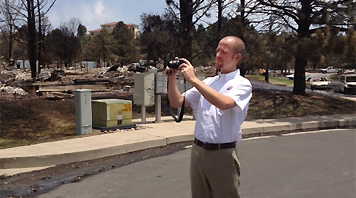|
|
#NoRoofScam Campaign Fighting Roofing Fraud in Colorado During Severe Weather DENVER, January 13 – A group of nonprofit, government, and business organizations are working together to fight roofing contractor fraud in Colorado with a new public education campaign called No Roof Scams. The campaign's goal is to sound an alarm during severe weather about the spike in roofing fraud and arm Colorado homeowners with information to protect themselves against being victimized by roofing scams. Help us spread the word by using #NoRoofScams and sharing anti-fraud advice, resources and messages.
This week's latest round of damaging strong winds and heavy snow throughout Colorado and specifically Colorado Springs, Northern Colorado and the Mountain communities serves as a reminder that Mother Nature can strike at any time of the year.
Strong winds can create stress points on a roof that, over time, can weaken and become compromised. Roofs are designed to resist typical wind loads, but can be progressively damaged over the years by high winds and debris carried by the wind. If you think you have roof damage caused by wind and/or flying debris, it's important to get it fixed immediately. The longer you wait, the more damage will occur. Roof repair and/or replacement costs a lot less when you don't have to add in the other expenses of repairing leaks and water damage. Depending on the amount of wind damage, you may only need minor repairs while other damage could result in more costly repairs.
Colorado mountain communities need to be twice as aware. Not only are they getting the strong winds but also record snow fall that is creating heavy snow loads on roofs. Often what is portrayed as a "roof snow-removal company" is merely a group of guys with business cards and a truck. They have no clue how to properly remove snow from roofs without causing damage. For tips on getting roof snow removed properly, read HomeLink Magazine's Winter 2014 Article on Mountain Roof Snow Removal by Jeff Johnston, Vice President of CRA. The longer roofs remain with heavy amounts of snow, the bigger the risk of damage to property or people.
Contact your insurance agent or company to assess the situation and determine whether you should file a claim or not. The roof is every building's first line of defense against Mother Nature, and Colorado's roofs need to be as strong as possible given all the severe weather events that occur here.
Unfortunately, these severe storms can bring out the worst in people, especially unscrupulous roofing contractors who scam consumers needing to repair or replace their storm-damaged roofs. These fraudsters will often make false promises, insist on full payment upfront before work is completed, and sometimes even create damage where none occurred.
While most contractors are honest and reputable, others are not. In fact, the highest number of consumer inquiries to the Better Business Bureau of Denver-Boulder involve selecting reputable roofing contractors.
There are many things consumers can do to guard against being the victim of a fraudulent roofing contractor.
Organizations participating in the No Roof Scams campaign include:
Follow #NoRoofScams to learn more about how consumers can avoid being the victims of unethical roofing contractors and find reputable roofing contractors.
### Rocky Mountain Insurance Information Association is a non-profit consumer information organization. Affiliated with the Insurance Information Institute, RMIIA has been serving consumers and the media since 1952. |
|
303-790-0216 • 800-355-9524 • Contact Us • Legal Notice, Disclaimer & Terms of Use
Home • About RMIIA • News Room • P&C Insurance Industry • Auto • Homeowners • Business • Catastrophes • Agent Resources • Events & Education • Brochures


